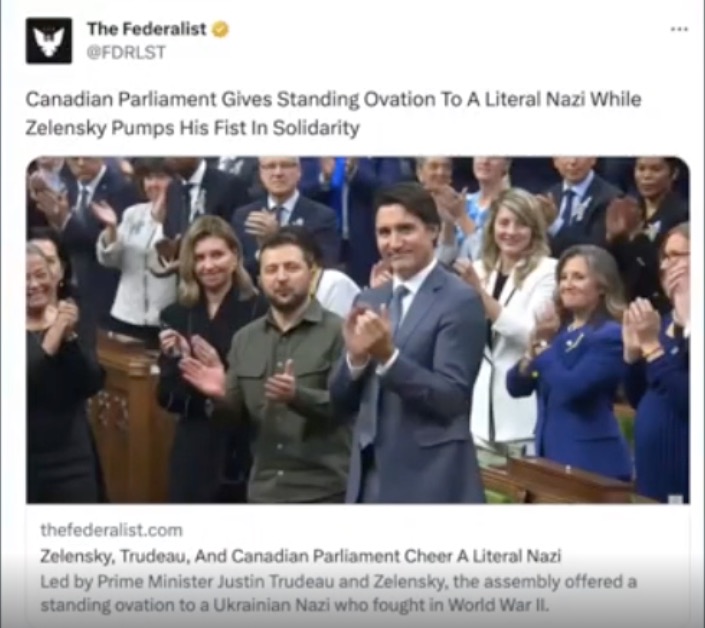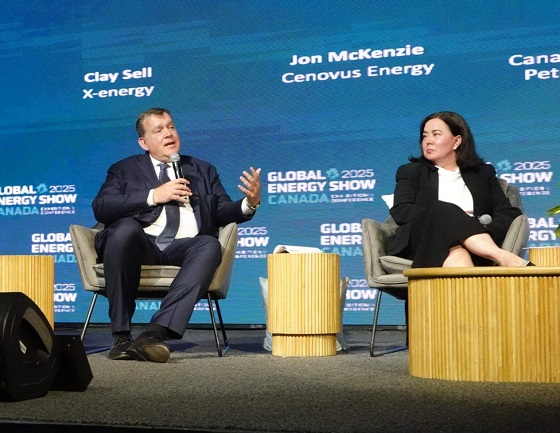Opinion
Standing Ovation for a Nazi – Federal government creates international outrage by honouring WWII Nazi SS soldier

The Speaker of the House of Commons has already resigned. General apologies have been made. Canada’s Liberal government is hoping to move on from this monumental gaff as soon as possible. But it might not be that easy.
It could be some time before we realize the implications of what might be this government’s biggest international mishap, ever. For a quick description of what exactly happened in the House of Commons and to show how other countries are seeing this brutal mistake, we share this video from The Telegraph.
From The Telegraph
The speaker of Canada’s House of Commons has apologised to Jewish communities after honouring a veteran who fought for a military unit under Nazi command during World War Two. Anthony Rota had invited his fellow MPs to give a standing ovation to Yaroslav Hunka, 98, following Ukrainian President Volodymyr Zelensky’s address to Parliament on Friday. Mr Rota introduced Mr Hunka as a war hero who fought for “Ukrainian independence against the Russians”. Read the full story here: https://www.telegraph.co.uk/world-new…
The average Canadian (maybe not out west) has gone from at least mildly admiring the youthful vigour of Prime Minister Justin Trudeau, to cringing every time he boards an airplane. Somehow Trudeau always seems to find a way to make himself look silly on the road, and now at home too. With each passing month the rest of the world takes Canada a little less seriously. This may have reached an inflection point.
Sure, Speaker Anthony Rota jumped on his sword but the buck definitely does not stop at the Speaker’s chair. With Ukrainian President Volodymyr Zelensky present, the PMO would be fully aware the eyes of the world would ever so briefly be pointed towards Ottawa. Either they had every moment planned, or they should have.
The PMO can’t win here. If they knew about Mr Hunka’s invitation, my oh my this is definitely beyond an ‘egg in the face’ situation. After years of equating political opponents and truckers with Nazi’s, they actually invite a real Nazi into the House of Commons and give him a standing ovation, WITH THE ENTIRE WORLD WATCHING! On the other hand, IF and that’s a capital I and a capital F, the PMO truly was actually surprised by the Speaker’s choice for honoured guest, they have only themselves to blame for not vetting absolutely everyone and everything that happened during President Zelensky’s short visit. Either way… WOW this is bad.
It will be interesting to see how the regular ‘legacy’ media follows up with coverage over the next few days and perhaps even weeks. The independent media coverage is absolutely scathing. Those who wish to dismiss independent media are ignoring a large and growing segment of the population who don’t necessarily agree with Canada’s ongoing and very expensive support of Ukraine’s military effort.
In this video a discussion about what happened in Ottawa and what the response might be around the world.
Censorship Industrial Complex
Jordan Peterson reveals DEI ‘expert’ serving as his ‘re-education coach’ for opposing LGBT agenda

From LifeSiteNews
The Ontario College of Psychologists has selected Jordan Peterson’s “re-education coach” for having publicly opposed the LGBT agenda.
In a June 16 op-ed published by the National Post, Canadian psychologist Dr. Jordan Peterson revealed that U.K. citizen Harry Cayton will guide him through the mandatory training.
“In the last week … the College has re-established contact, after months of unnecessary delay, which occurred in violation of their own order and guidelines. They have made me an entirely new offer, all the while insisting that this was their intent all along, which it most clearly was not,” Peterson said.
“All they really want, it turns out, is one two-hour session, which will not involve any ‘social media’ training,” he further explained. “This will be conducted by a man — one Harry Cayton — a citizen of the U.K., who is neither social media expert, according to the College and is definitely not a psychologist.”
Harry Cayton, a supposed expert on “professional regulation and governance,” is known professionally for promoting Diversity, Equity, and Inclusion (DEI) initiatives.
In 2021, he was appointed to conduct an independent review of the British Columbia Law Society’s governance structure, specifically examining how it supports DEI goals.
Additionally, in 2022, while appearing on Ascend Radio’s podcast, Cayton argued there should be more DEI regulations in professional associations.
Peterson has promised to make the details of his “re-education” public, questioning why the College wishes to hide what Cayton plans to discuss with him.
“If I am the intransigent fool, and he is the wizard to set things right, why not bless everyone interested with his wisdom, and allow them to participate in the restructuring of my psyche and eventual enlightening? Why the concern with confidentiality?” he asked.
Peterson also explained that he will publicize the training “so that people who are interested can decide for themselves what is going on.”
In January 2024, Peterson lost his appeal of the board’s decision to compel him to undergo mandatory re-education, meaning that he must attend the training or risk losing his license to practice psychology in Ontario.
Peterson also revealed that his “legal options have” now “been exhausted” after Ontario’s highest court rejected his appeal of the College’s 2022 ruling that his public political statements ran afoul of the administrative board’s rules and that he must therefore submit to, and personally pay for, a “coaching program” on professionalism.
Peterson is a widely-known critic of Canada’s increasingly totalitarian government. He has also spoken frequently on the need for young men to accept and take on personal responsibility. While he has seemingly inspired others to explore Christianity, he has not yet espoused a personal belief in any religion, though he affirmed his wife Tammy in her decision to convert to Catholicism in 2024.
Business
Rhetoric—not evidence—continues to dominate climate debate and policy

From the Fraser Institute
Myths, fallacies and ideological rhetoric continue to dominate the climate policy discussion, leading to costly and ineffective government policies,
according to a new study published today by the Fraser Institute, an independent, nonpartisan Canadian public policy think-tank.
“When considering climate policies, it’s important to understand what the science and analysis actually show instead of what the climate alarmists believe to be true,” said Kenneth P. Green, Fraser Institute senior fellow and author of Four Climate Fallacies.
The study dispels several myths about climate change and popular—but ineffective—emission reduction policies, specifically:
• Capitalism causes climate change: In fact, according to several environment/climate indices and the Fraser Institute’s annual Economic Freedom of the World Index, the more economically free a country is, the more effective it is at protecting its environment and combatting climate change.
• Even small-emitting countries can do their part to fight climate change: Even if Canada reduced its greenhouse gas emissions to zero, there would be
little to no measurable impact in global emissions, and it distracts people from the main drivers of emissions, which are China, India and the developing
world.
• Vehicle electrification will reduce climate risk and clean the air: Research has shown that while EVs can reduce GHG emissions when powered with
low-GHG energy, they often are not, and further, have offsetting environmental harms, reducing net environmental/climate benefits.
• Carbon capture and storage is a viable strategy to combat climate change: While effective at a small scale, the benefits of carbon capture and
storage to reduce global greenhouse gas emissions on a massive scale are limited and questionable.
“Citizens and their governments around the world need to be guided by scientific evidence when it comes to what climate policies make the most sense,” Green said.
“Unfortunately, the climate policy debate is too often dominated by myths, fallacies and false claims by activists and alarmists, with costly and ineffective results.”

Kenneth P. Green
Senior Fellow, Fraser Institute
-

 Health2 days ago
Health2 days agoLast day and last chance to win this dream home! Support the 2025 Red Deer Hospital Lottery before midnight!
-

 Alberta2 days ago
Alberta2 days agoAlberta announces citizens will have to pay for their COVID shots
-

 Uncategorized2 days ago
Uncategorized2 days agoKananaskis G7 meeting the right setting for U.S. and Canada to reassert energy ties
-

 Business2 days ago
Business2 days agoCarney’s Honeymoon Phase Enters a ‘Make-or-Break’ Week
-

 conflict2 days ago
conflict2 days agoTrump leaves G7 early after urging evacuation of Tehran
-

 Business2 days ago
Business2 days agoTrump family announces Trump Mobile: Made in America, for America
-

 Crime2 days ago
Crime2 days agoUK finally admits clear evidence linking Pakistanis and child grooming gangs
-

 International1 day ago
International1 day agoTrump not seeking ceasefire with Israel, Iran as he rushes back to White House




